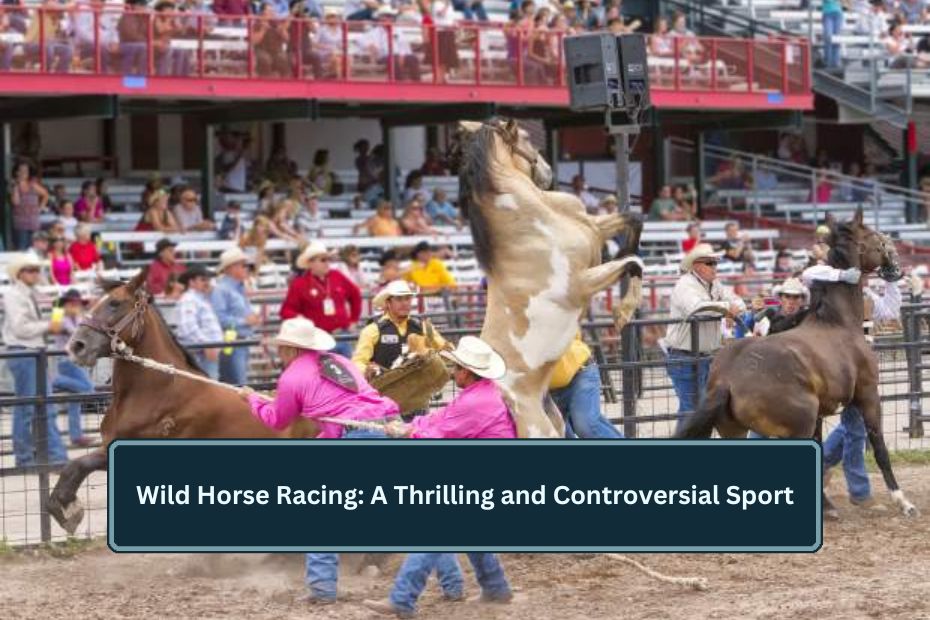Wild horse racing is an exciting yet controversial sport that captivates audiences worldwide. Unlike traditional horse racing, where trained horses compete on tracks, wild horse racing features untamed horses with minimal preparation. This thrilling event combines raw energy, skill, and unpredictability, but it also raises ethical concerns regarding the treatment of animals. In this article, we’ll dive into the history, rules, participants, and controversies surrounding wild horse racing.
What is Wild Horse Racing?
Wild horse racing involves racing horses that are not domesticated and often have little to no training. Unlike traditional races, the horses are ridden by volunteers who have minimal preparation. The races are held in open fields or designated tracks and can include challenging terrain and obstacles. This makes wild horse racing an unpredictable and exhilarating spectacle.
History and Origins
The origins of wild horse racing date back to ancient civilizations where horse races were central to cultural rituals and celebrations. Modern wild horse racing, however, gained prominence in the American West during the 19th century. Over time, the sport spread to other regions, including Mongolia and South America, where it evolved as a key cultural event.
- In the U.S., events like the Cheyenne Frontier Days in Wyoming have become notable for hosting wild horse races.
- In Mongolia, wild horse races are a central part of the Naadam Festival, a celebration of the nation’s traditional heritage.
Training and Race Format
Preparing wild horses for racing is far less structured than the training of traditional racehorses. The process involves capturing wild horses—such as mustangs—and gradually introducing them to human contact. Riders must build trust with the horses over time, teaching them to wear saddles and accept riders, though this process is minimal compared to the intense training of racehorses.
Races typically take place in open fields or tracks that feature rough terrain, making the race more challenging. Participants are expected to navigate both the terrain and the unpredictability of the horses.
Ethical Concerns and Safety Issues
Despite its thrill, wild horse racing faces significant ethical concerns, primarily regarding the treatment of the horses involved:
- Animal Welfare: Many animal rights activists argue that the sport is cruel due to the lack of training and the harsh conditions the horses are subjected to.
- Risk of Injury: Wild horses are at higher risk of injury during the races, as they are not conditioned for the physical exertion required in the event.
- Rider Safety: Riders, who are often untrained, may also face danger as they attempt to control the wild horses during the race.
Despite these concerns, some supporters maintain that the sport helps preserve cultural traditions and provides a platform for wild horse conservation.
Famous Wild Horse Races Around the World
Wild horse racing has gained global recognition, with several countries hosting major events:
- Cheyenne Frontier Days: Held annually in Wyoming, USA, this event is one of the most well-known wild horse races.
- Mongolia: The Naadam Festival includes wild horse races as a part of the nation’s cultural celebrations.
- South America: Countries like Argentina and Chile continue to hold wild horse races rooted in their cowboy traditions.
Future of Wild Horse Racing
As wild horse racing grows in popularity, its future may be shaped by increasing concerns over animal welfare:
- Cultural Impact: In some regions, wild horse racing remains an essential part of local heritage, drawing large crowds each year.
- Growing Controversy: However, the sport is facing mounting criticism due to its impact on the horses involved. Animal rights organizations are calling for reforms to protect the animals.
- Potential Solutions: Advocates suggest that stricter regulations, improved safety measures, and better care for the horses could help preserve the sport while ensuring the welfare of the animals.
Conclusion
Wild horse racing continues to be a thrilling and unpredictable sport, but the ethical and safety concerns surrounding it cannot be overlooked. As the sport evolves, it will likely face greater scrutiny, with a balance needing to be struck between preserving cultural traditions and protecting animal welfare. The future of wild horse racing will depend on how well these issues are addressed.
FAQ’s
What is wild horse racing?
Wild horse racing is a sport where untamed, wild horses race across open fields or tracks. The horses are ridden by volunteers with little to no training, making the races unpredictable and thrilling.
Is wild horse racing safe for the horses?
Wild horse racing poses risks for the horses due to their lack of training and the challenging race conditions. While some safety measures are in place, concerns about animal welfare and injuries remain significant.
Where are wild horse races held?
Wild horse races are held in various parts of the world, including the U.S. (Cheyenne Frontier Days), Mongolia (Naadam Festival), and South America (Argentina and Chile), where they are part of cultural traditions.

